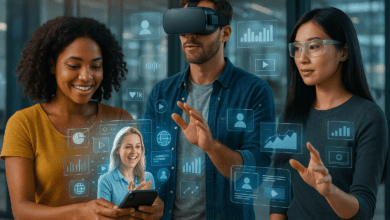The Rise of AI: How Artificial Intelligence is Changing Our Daily Lives

Artificial intelligence (artificial intelligence) is no longer just a topic in science fiction movies—it’s shaping the way we live, work, and interact every single day. From voice assistants like Siri or Alexa to AI algorithms that curate your Netflix recommendations, these technological marvels are seamlessly embedding themselves into our daily routines. But what does this mean for us? How is artificial intelligence in daily life fundamentally altering the world we live in?
This blog dives deep into how artificial intelligence in daily life is transforming key areas of our lives, showcasing both its innovations and challenges. Whether you’re an AI enthusiast or someone casually curious about the latest tech trends, get ready to explore the impact of AI in ways that are closer to home than you might think.
How Artificial Intelligence in Daily Life is Integrated into Our Routines
Artificial intelligence in daily life is not a distant future concept; it’s already embedded in our daily activities. From simple conveniences to complex problem-solving, AI technologies are working behind the scenes in ways you might not always notice. Let’s explore some of the most prominent applications of AI that have already transformed how we live.
Virtual Assistants and Smart Homes
Remember the days when setting reminders, checking the weather, or playing music required manual effort? Thanks to artificial intelligence in daily life, these tasks are now voice-activated and highly intuitive. Virtual assistants like Amazon Alexa, Apple’s Siri, and Google Assistant have become household staples, helping to manage daily routines effortlessly.
What Can Artificial Intelligence Do for You in Smart Homes?
- Voice Commands Simplified: With just your voice, you can control smart appliances, adjust lighting, play your favorite tunes, or even get real-time traffic updates while preparing for your day.
- Enhanced Home Automation:
- Smart Thermostats like Nest learn your temperature preferences over time, adjusting heating and cooling to maximize comfort and reduce energy consumption.
- AI-powered lighting systems can automatically adjust brightness and color based on the time of day or your mood, creating a personalized ambiance.
- Security Upgrades: AI-enabled cameras and doorbells, such as those from Ring, can distinguish between a person, an animal, or a package delivery. This helps reduce false alerts and ensures your home is protected efficiently. According to recent studies, over 40% of households in developed countries now use some form of smart home devices powered by AI.
The smart home revolution powered by artificial intelligence in daily life is not just about convenience—it’s about creating safer, more efficient, and responsive living environments.
AI in Communication and Social Media
From Instagram to TikTok, social media platforms are driven by AI algorithms that tailor your feed to match your preferences and behaviors. Artificial intelligence in daily life plays a critical role in how we consume and interact with digital content, shaping our online experiences in ways both visible and subtle.
- Email Suggestions: Tools like Gmail’s Smart Reply and Smart Compose use AI to draft quick responses or help you compose emails more efficiently, saving valuable time.
- Curated Content: AI curates your social media feeds, surfacing posts from friends or topics you care about, while introducing new content based on your interactions and trends.
- Spam Protection: Advanced AI models work tirelessly to filter out spam, scams, and harmful content, helping keep digital spaces safe and trustworthy.
However, this AI-driven curation also poses challenges—especially regarding data privacy, echo chambers, and addictive content designs that can impact mental health.
It’s estimated that over 70% of social media content is curated or recommended by AI, making it essential for users to understand how their data is used and to practice digital mindfulness.
Healthcare Innovations with Artificial Intelligence in Daily Life
The healthcare industry is arguably one of the most positively impacted by artificial intelligence in daily life. Learn more about AI in healthcare, which improves diagnosis accuracy, patient monitoring, and personalized treatment plans, ultimately saving lives and streamlining healthcare delivery.
Key Examples of AI in Healthcare
- Wearables and Fitness Apps: Devices like Fitbit, Apple Watch, and Garmin utilize AI to analyze heart rate variability, sleep cycles, and activity levels, providing users with actionable insights and health alerts.
- Early Diagnosis Tools: AI algorithms analyze imaging data such as MRIs and X-rays to detect early signs of diseases like cancer or neurological disorders, often with higher accuracy than traditional methods.
- Telemedicine and Virtual Assistants: AI-driven virtual health assistants can triage patient symptoms, schedule appointments, and offer medical advice—improving access to care, especially in remote areas.
Furthermore, AI-driven drug discovery platforms are speeding up the process of finding new treatments, a critical advancement highlighted during the recent global health crises.
Transformation in Transportation
Transportation has been revolutionized by artificial intelligence in daily life, not only with self-driving vehicles but also with intelligent routing and ride-sharing optimization that improve safety and efficiency.
- Self-Driving Cars: Companies like Tesla, Waymo, and Uber are pioneering autonomous vehicle technologies, integrating AI to reduce human error and enhance road safety.
- Intelligent Navigation: Google Maps and Waze use AI to predict traffic congestion and offer real-time alternative routes, saving millions of commuters valuable time daily.
- Dynamic Ride-Hailing Services: AI adjusts ride prices based on demand and supply, efficiently matching riders and drivers in platforms like Uber and Lyft.
Transportation is evolving quickly, with pilot programs exploring AI-enabled drones for package delivery and smart traffic management systems aiming to reduce congestion and emissions.
Artificial Intelligence Empowering Businesses and Workplaces
Businesses across industries are leveraging artificial intelligence in daily life to automate routine tasks, enhance customer experience, and make data-driven decisions that drive growth and innovation.
- AI-Powered Customer Service: Chatbots and virtual assistants provide instant, round-the-clock support, resolving common queries and freeing human agents to handle complex cases.
- Advanced Data Analytics: AI sifts through large datasets to identify trends, forecast demand, and recommend strategic actions that improve operational efficiency.
- Personalized Marketing and Shopping: Retailers like Amazon and Netflix use AI to deliver personalized product recommendations, increasing customer satisfaction and sales.
Additionally, AI-driven recruitment platforms help companies identify the best candidates faster, and automated financial advisors are making investment management accessible to more people.
Retail and Shopping Made Smarter
Shopping is becoming a highly personalized experience thanks to artificial intelligence in daily life. From tailored recommendations to efficient inventory control, AI is changing the face of retail.
- Product Recommendations: Platforms like Shopify and Amazon use AI algorithms to suggest items you are most likely to purchase based on your browsing and purchase history.
- Inventory Management: AI predicts demand patterns and helps retailers maintain optimal stock levels, minimizing waste and ensuring product availability.
These innovations make e-commerce more efficient and customer-friendly, setting new standards for shopping worldwide.
Read Also
AI in Education and Personalized Learning
One of the most exciting frontiers of artificial intelligence in daily life is education. AI is being used to create personalized learning experiences, adapt teaching methods to individual student needs, and make education more accessible worldwide.
- Adaptive Learning Platforms: AI-powered systems analyze a student’s strengths and weaknesses, providing customized lessons and resources that adjust dynamically as the student progresses.
- Automated Grading and Feedback: AI tools can grade assignments and offer detailed feedback faster than traditional methods, allowing educators more time to focus on teaching.
- Language Translation and Accessibility: AI helps break down language barriers with real-time translation and transcription, making educational content accessible to non-native speakers and those with disabilities.
By making learning personalized and inclusive, AI is helping to democratize education and prepare future generations for a rapidly evolving world.
AI in Environmental Sustainability
Artificial intelligence in daily life also extends to helping address global challenges like climate change and resource conservation.
- Smart Energy Management: AI systems optimize energy usage in homes, buildings, and cities by predicting demand and adjusting supply from renewable sources efficiently.
- Environmental Monitoring: AI analyzes data from satellites and sensors to track deforestation, air and water quality, and wildlife populations in real time.
- Waste Reduction: AI improves recycling processes by sorting materials more accurately and identifying waste reduction opportunities in supply chains.
These AI-driven efforts contribute significantly to a more sustainable future, helping individuals and organizations reduce their environmental footprints.
AI for Accessibility and Inclusion
Making technology accessible to everyone is a core goal of modern AI applications.
- Speech Recognition and Assistive Devices: AI-powered tools enable people with speech or mobility impairments to communicate and control devices using voice commands or eye movements.
- Visual Assistance: Apps use AI to describe surroundings to visually impaired users via smartphone cameras, providing real-time information and navigation help.
- Automatic Captioning and Translation: AI generates captions for videos and live conversations, making content accessible to deaf or hard-of-hearing individuals.
These inclusive AI technologies are breaking down barriers, enabling more people to participate fully in society.
AI in Entertainment Beyond Social Media
While social media is a significant AI domain, entertainment as a whole benefits from AI innovations.
- Content Creation: AI helps artists and producers generate music, art, and storylines, pushing creative boundaries and personalizing entertainment experiences.
- Game Design and Play: Video games use AI for dynamic storytelling, smarter non-player characters (NPCs), and adapting difficulty levels to player skill.
- Recommendation Engines: Streaming services like Netflix and Spotify use AI to recommend movies, shows, and music tailored to individual tastes.

AI is enriching entertainment by making it more interactive, immersive, and personal.
AI and Mental Health Support
Emerging AI applications are supporting mental health through accessible, stigma-free tools.
- Chatbots for Mental Health: AI chatbots provide cognitive behavioral therapy (CBT) exercises, mood tracking, and crisis intervention resources 24/7.
- Emotion Recognition: AI analyzes speech and facial expressions to detect signs of stress or depression, offering timely interventions or recommendations.
- Personalized Wellness Plans: AI tailors meditation, exercise, and lifestyle suggestions to individual needs, encouraging healthier habits.
Such AI tools are helping democratize access to mental health care, especially in underserved communities.
Summary Table: AI Applications and Benefits
| Category | AI Use Case | Benefits | ||
|---|---|---|---|---|
| Smart Homes | Voice Assistants, Smart Thermostats | Convenience, Automation, Security | ||
| Healthcare | Wearables, Diagnosis Tools | Early Detection, Better Patient Care | ||
| Transportation | Self-driving cars, Navigation | Safer Travel, Time Efficiency | ||
| Social Media | Content Recommendations, Spam Filters | Engagement, Security | ||
| Business | Customer Support, Data Analysis | Productivity, Efficiency | ||
| Retail | Personalized Shopping, Inventory Management | Customer Retention, Stock Optimization | ||
| Education | Adaptive Learning, Automated Grading | Personalized Learning, Accessibility | ||
| Environment | Smart Energy, Environmental Monitoring | Resource Efficiency, Sustainability | ||
| Accessibility | Speech Recognition, Visual Assistance | Accessibility | Speech Recognition, Visual Assistance | Inclusion, Empowerment |
| Entertainment | AI-generated Content, Game AI | Interactivity, Personalization | ||
| Mental Health | Chatbots, Emotion Recognition | Access, Support |


